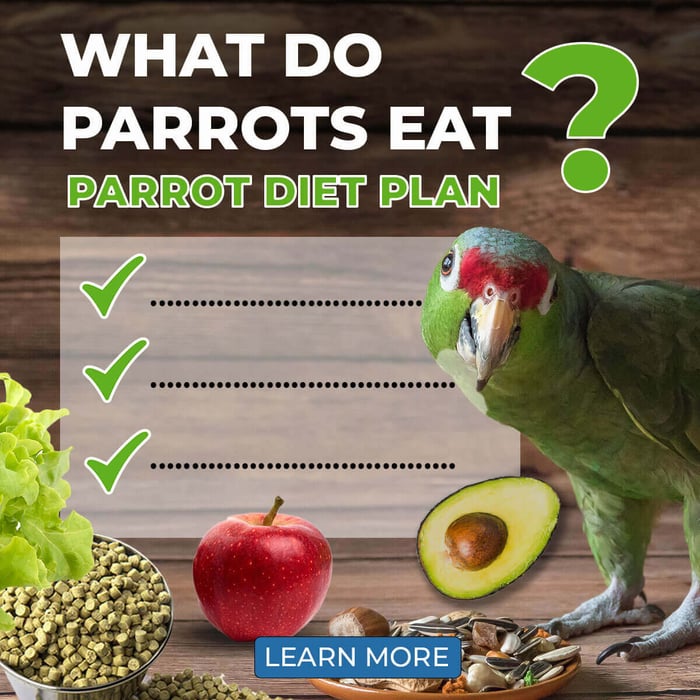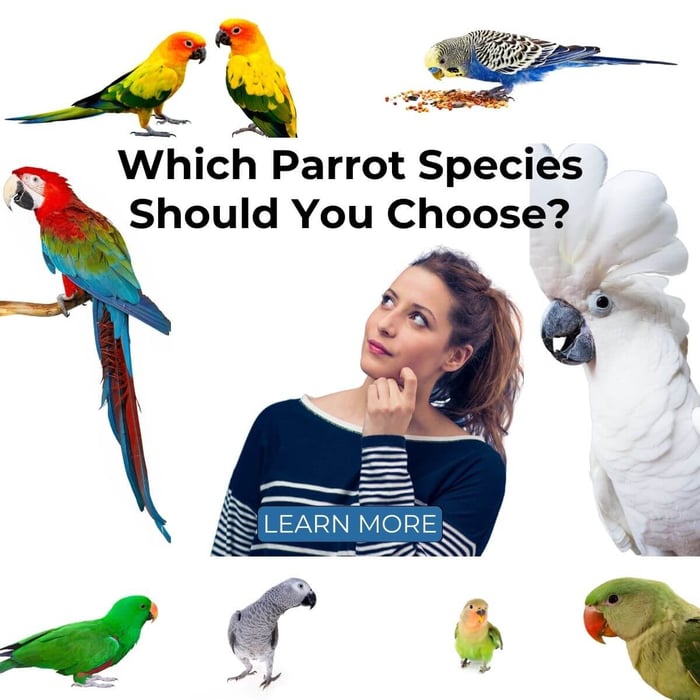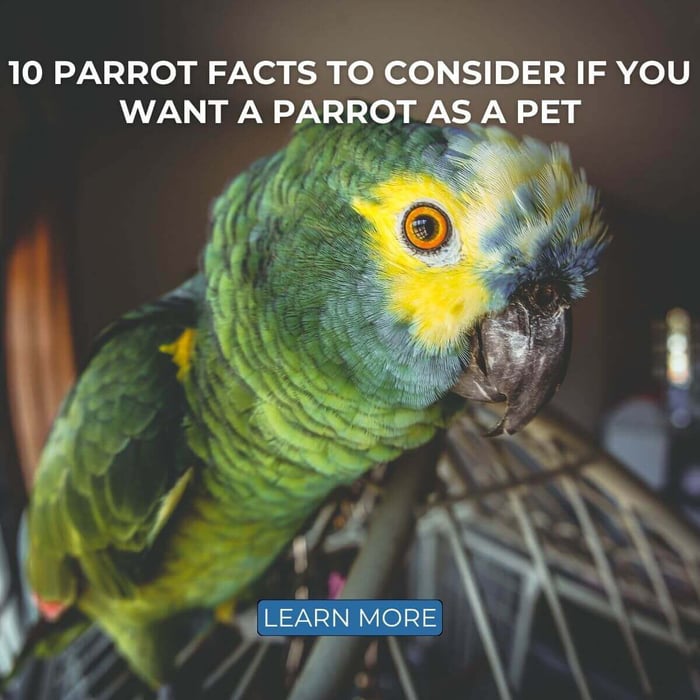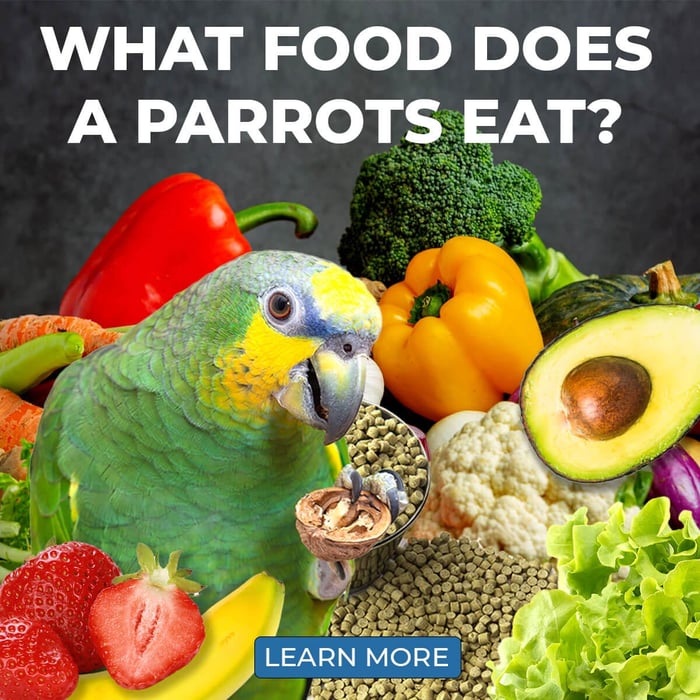What Can Parrots Eat and Not Eat?
Parrots are highly sociable eaters. If you’ve had your bird for a while, you’ll know that they love eating alongside their flock, whether that be other parrots or humans. The problem, of course, is that not all human foods are good for them. Domestic parrots depend on their human caregivers to put together a healthy diet for them, so it’s important to inform yourself about what can parrots eat and not eat.
A high-quality pelleted diet, lots of fresh vegetables, some fresh fruits and seeds, among other foods, all make healthy meals for your bird. Just make sure to offer plenty of variety: like wild parrots, which eat all sorts of different things, your pet parrot needs diversity so it gets all the (micro)nutrients it needs.

When to Feed Your Parrot
In the wild, parrots usually forage in the morning and evening. You can imitate this pattern by feeding your bird when you uncover the cage in the morning, plus an hour or two before you put it to bed. In between, to keep your parrot entertained and ensure it doesn’t go hungry, you could also consider offering some snacks in a foraging setting.
Aside from the standard parrot foods we mentioned earlier, there are many “human” foods that they can consume. However, certain items that people can comfortably eat are poisonous to birds. This is why it’s important to do a little bit of research, which this article should hopefully help with!
Below, you’ll find a list of items that can be fed to your parrot as part of a nutritious and complete diet.
Pellets and seeds
As discussed in our full parrot diet plan, for most parrot species, feeding around 75% pelleted food works well. Pellets are lower in calories and fat than the traditional parrot seed mix. They’re also more nutritious, although it’s important to find a high-quality brand that isn’t laden with filler ingredients or sweeteners.
Depending on the species, seeds can make up 5-10% of your parrot’s regular diet. Species that naturally eat seeds, like budgies and cockatiels, can have a little more. Some other parrots with more specialized diets, like lorikeets and Eclectus parrots, should barely be eating any seed mix at all.
Try not to overdo it with the seeds because the dried mixes you can buy for parrots don’t contain all the necessary nutrients. They’re quite fatty and not very rich in vitamins, leading to obesity and malnutrition if you feed them exclusively. Don’t forget to also try sprouting them! The nutritional profile of a seed really improves once it begins to germinate, and it’s easy to do so at home.
Parrots can be given a range of seeds, such as safflower, millets, oats, canary, and buckwheat seeds. Sunflower seeds should be limited to treats only due to their high-fat content.
Vegetables
Vegetables are a significant source of nutrition for your parrot. They can make up 15-20% of its daily meals, as they’re laden with important nutrients.
Veggies like broccoli, bell peppers, carrots, collard greens, squash, hot peppers, tomatoes, spinach, sweet potatoes, beets, zucchini and many others are safe for birds. You can mince them to make “chop”, but offering veg whole is also a good option. Just be sure to remove the stems from nightshades like tomato, peppers and eggplant.
Fruit
When giving fruit to your bird, try to choose organic varieties and clean them properly before serving. Safe fruits include apples, pears, bananas, mango, cherries, oranges, berries and much more. You can find a full list in the article of fruits for parrots! Do remember that fruits cultivated for human consumption are very sugary, so it’s best not to overdo it.
Many fruits can be eaten whole. Take watermelon, for example your parrot may even like the seeds more than the actual fruit! Exceptions are stonefruits like peaches and cherries, as well as apples and pears. The pits in those contain toxic compounds that shouldn’t be eaten by your bird.

Nuts
Although parrots absolutely love nuts, they must be given sparingly owing to their high-fat levels. It’s best to only give them as a treat and not include them in your bird’s daily diet!
You can provide all sorts of nuts, including almonds, Brazil nuts, cashews, hazelnuts, pecans, pistachios, walnuts and more. There is some discussion about peanuts, but human-grade peanuts that have been appropriately stored should be totally safe.
Make sure the seeds you choose are fresh, uncooked, and unsalted. Most of the larger parrots can be offered nuts with the shells on, which makes for a good foraging opportunity and keeps them busy eating for longer.
Drinks
Enjoying a drink with your pet is an excellent approach to building a relationship. Choose a suitable beverage that contains no refined sugar: water, weak lukewarm herbal tea, natural juices and smoothies are all great choices.
Alcohol, fizzy drinks, and caffeinated drinks like coffee are poisonous to parrots, just like to other beloved pets. Ensure your parrot never has access to them.
Legumes, sprouts, and beans
Parrots need plenty of protein in their diet. Some of this protein can come from animal sources, like eggs, the occasional mealworm and even a small piece of unsalted chicken once in a while. However, for more regular protein-rich meals, the best solution would be to go for things like beans, legumes, and sprouts. Excellent protein sources include cooked black beans, bean sprouts, kidney beans, lentils, simple tofu, and legumes.
Please remember that beans, especially kidney beans, should always be FULLY cooked. They can be toxic for both parrots and us humans if they’re not fully softened.

Grains
Depending on the species, some wild parrots eat grains. Your pet bird can have cooked pasta, rice, oats, wheat, barley, corn, bulgur and much more. Try going for a whole-wheat if possible. Sugary cereals are best avoided!
What can parrots eat and not eat: Foods to Avoid

Avocado
Numerous fruits are delicate for parrots to consume, but one type, in particular, is incredibly harmful and can kill a parrot: avocado. This fruit’s pit, peel and flesh are all toxic to our beloved birds. This is due to a component called persin, which wreaks havoc in their digestive tracts.
Because parrots are curious and don’t always know what’s good for them, keep any and all avocados out of your bird’s reach. No guacamole, no avo toast, and no avocado salad, please!
Some spices
Although there are many spices for parrots that are perfectly safe, some are best avoided. These include Chinese cinnamon, mace and nutmeg.
Dried garlic and onion powder can also be problematic, more so than their fresh counterparts, as they’re more concentrated. Prolonged consumption can lead to problems like anaemia.
Salt
We humans just love salty foods: crackers, snacks, crisps, chips. However, just as too much salt is bad for us, it’s also bad for our birds. A bird’s tiny body’s electrolyte and water balance can be disturbed by even a single salty chip or pretzel, which can, in unlucky cases, cause issues like extreme dehydration, exhaustion, renal failure, and even death.
And yes, we know that the foods we mentioned here are every parrot’s favourite snack. They’d sell their soul for a Dorito! Still, you should limit the consumption of these processed, salty foods to just a crumb here and there.
Coffee

Your parrot cannot drink coffee, even though it may be a necessary part of your own day. Not only is coffee bad for birds, but it’s also poisonous. This is due to the presence of caffeine in any quantity: parrots are much smaller than us, which causes them to be affected way more strongly.
The group of alkaloids known as dimethyl xanthine includes caffeine. This substance stimulates the central nervous system, and the heart and muscles are subsequently stimulated. When consumed, methylated xanthine is toxic to parrots and can cause tachycardia or an abnormally rapid pulse.
Chocolate
Like humans, some birds are total chocolate fiends. However, as tasty as it is, chocolate can be harmful to birds even in minimal doses. It contains theobromine with caffeine, which can make people nauseous and dizzy, speed up their hearts, cause hyperactivity or even provoke tremors and seizures in very large doses.
For birds, chocolate can be fatal. Again, we know parrots are great at begging. You should resist the urge and give your pet some sweet fruit instead, like mangoes, bananas or grapes.
Can I give my parrot alcohol?
Even in tiny (just a few drops) doses, alcoholic drinks can produce confusion, discomfort, and an elevated heart rate. Human systems can eliminate poisons from alcohol, but birds cannot. Keep beer, wine, spirits and any other type of alcohol away from your parrot at all times!
Summary: What can parrots eat and not eat?
Simple everyday observation: a well-fed bird has lively eyes, gleaming feathers, and an active stance. Some of the above human meals are beneficial to parrots, while others can be lethal.
Your parrot’s diet should primarily consist of pellets, fruits, vegetables, seeds, and nuts. It’s always preferable to feed fresh, natural foods than processed, sugary or salty meals.




